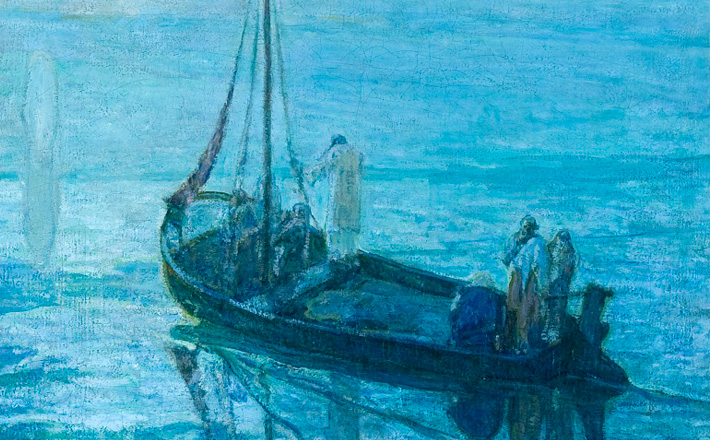Commentary on 1 Kings 19:9-18
First Kings 19 is the lowest point in Elijah’s career.
Arrested by fear of Jezebel’s threats, he sinks deeper and deeper into the depths of unbelief, to such a degree that even a powerful theophany — on par with the revelation Moses received on Sinai (see Exodus 34) — does not move him from unbelief into faith. Jezebel’s threats (verse 2) — not Yhwh’s1 word — motivate Elijah’s actions, to the point that Elijah’s career comes to a somewhat anticlimactic and tragic end.
The tragic nature of Elijah’s fall from glory is made all the more apparent when juxtaposed with 1 Kings 18, where Elijah boldly faces down the prophets of Jezebel, insisting upon the primacy of the first commandment: “You shall have no other gods before me” (Exodus 20:3; Deuteronomy 5:7). His career climaxes on Mt. Carmel (1 Kings 18), only to plummet on Mt. Sinai (1 Kings 19). As gloomy as it may sound, 1 Kings 19 is the story of Elijah’s decommissioning, and of God’s choice to use another more willing servant.
Key to understanding 1 Kings 19:9-18 is recognizing that Elijah walks an ancient path, one taken by Moses himself: After killing Jezebel’s prophets in Chapter 18, Elijah catches wind of the queen’s ire (1 Kings 19:2) and flees into the wilderness (cf. Exodus 2:11-15). While in the wilderness, Elijah is miraculously provisioned by an angel (1 Kings 19:3-8; cf. the wilderness narratives in Exodus 15:22-19:2).
He arrives at Horeb, another name for Sinai, and is then told by Yhwh to ascend the mountain (1 Kings 19:11; cf. Exodus 19:20). While on the mountain, the Mosaic parallels continue. For instance, Yhwh “passes by” (√?br) at a moment of revelation (1 Kings 19:11) just as Yhwh “passed” before (√?br) Moses in Exodus 34:6. As it was for Moses, Horeb becomes for Elijah a mountain of revelation.
Although cast in the image of Moses, Elijah quickly steps off the Mosaic path when Jezebel’s threats rob him of all faith: “Thus and more may the gods do if by this time tomorrow I have not made you like one of them” (1 Kings 19:2). Unlike Moses, who stood up to Pharaoh with all the power of God and creation at his back, Elijah cowers before Jezebel, unable to grasp the might available to him. Elijah makes two identical speeches (underlined below) that demonstrate how deeply paralyzed he has become by the queen’s words. These speeches frame Yhwh’s revelation on Horeb/Sinai:
There he went into a cave, and there he spent the night. Then the word of the LORD came to him. He said to him, “Why are you here, Elijah?” He replied, “I am moved by zeal for the LORD, the God of Hosts, for the Israelites have forsaken Your covenant, torn down Your altars, and put Your prophets to the sword. I alone am left, and they are out to take my life.” “Come out,” He called, “and stand on the mountain before the LORD.” And lo, the LORD passed by. There was a great and mighty wind, splitting mountains and shattering rocks by the power of the LORD; but the LORD was not in the wind. After the wind — an earthquake; but the LORD was not in the earthquake. After the earthquake — fire; but the LORD was not in the fire. And after the fire — a soft murmuring sound.
When Elijah heard it, he wrapped his mantle about his face and went out and stood at the entrance of the cave. Then a voice addressed him: “Why are you here, Elijah?” He answered, “I am moved by zeal for the LORD, the God of Hosts; for the Israelites have forsaken Your covenant, torn down Your altars, and have put Your prophets to the sword. I alone am left, and they are out to take my life.”(1Kings 19:9-14 TNK)
Comparable to Job 38-41, Yhwh in verses 9-14 attempts to use powerful creational forces (wind, earthquake, and fire) to reorient his servant away from the words of Jezebel and toward the power of Yhwh. Although Yhwh is not found “in” any of these manifestations (a subtle anti-Baal polemic is likely at play here), they are nonetheless part of the dramatic theophanic event, which intends to snap Elijah out of his despondency. Remarkably, Elijah’s responses to Yhwh, both before and after the theophany, are identical.
Moreover, they are simply not true. He is not the only one left who is loyal to Yhwh. In fact, Elijah was largely responsible for leading many Israelites to repentance (see 1 Kings 18:38). And what about Obadiah, about whom the text says, he “revered the Lord greatly” (1 Kings 18:3)? Blinded by fear, Elijah is unable to see Yhwh’s work on Mt. Carmel and elsewhere.
Furthermore, unlike his penitent audience at Mt. Carmel, the fire of God does not move Elijah to repentance or loose him from the bonds of fear. The fact that Elijah’s two speeches are identical indicates that experiencing Yhwh’s demonstration of creational power had no effect on the prophet. He clings to Jezebel’s words rather than to Yhwh’s words.
Elijah’s life descends from fear into disobedience. We see this only too clearly when we examine Yhwh’s final instructions for Elijah in 1 Kings 19:
The LORD said to him [Elijah], “Go back by the way you came, and on to the wilderness of Damascus. When you get there, anoint Hazael as king of Aram. Also anoint Jehu son of Nimshi as king of Israel, and anoint Elisha son of Shaphat of Abel-meholah to succeed you as prophet. Whoever escapes the sword of Hazael shall be slain by Jehu, and whoever escapes the sword of Jehu shall be slain by Elisha. I will leave in Israel only seven thousand — every knee that has not knelt to Baal and every mouth that has not kissed him.” (1 Kings 19:15-18 TNK)
Elijah is given three charges: (1) anoint Hazael as king of Aram; (2) anoint Jehu son of Nimshi as king of Israel (i.e., the Northern Kingdom); and (3) anoint Elisha son of Shaphat as Elijah’s replacement. This new wave of divine agents will finish the bloody religious crusade Elijah began in 1 Kings 18 (The problematic nature of these images should be acknowledged, especially in the current cultural and political environment).
But does Elijah actually obey God in these matters? Yes and no. To be sure, Elijah throws his mantle on Elisha, who becomes his attendant (1 Kings 19:19-21; cf. the alternate mantle account in 2 Kings 2:1-18, which likely comes from a different source that casts Elijah’s departure from the prophetic office more positively). But it is Elisha who commissions Hazael (2 Kings 8:3-15), not Elijah, and Elisha who anoints Jehu (2 Kings 9:1-10), again, not Elijah.
First Kings 19, then, leaves us with a troubling and tragic picture of the once-great Elijah: fearful, curved in on himself, faithless, and ultimately disobedient to his call. In an act of compassion, Yhwh gives Elijah a way out in the person of Elisha. The tasks to which Elijah was called are eventually accomplished, despite the resistance of Elijah, because Yhwh is able to find another, more willing prophet — namely, Elisha, who wears the mantle Elijah no longer wanted.
Notes:
1 Out of respect for our Jewish sisters and brothers, I do not vocalize the divine name.


August 10, 2014